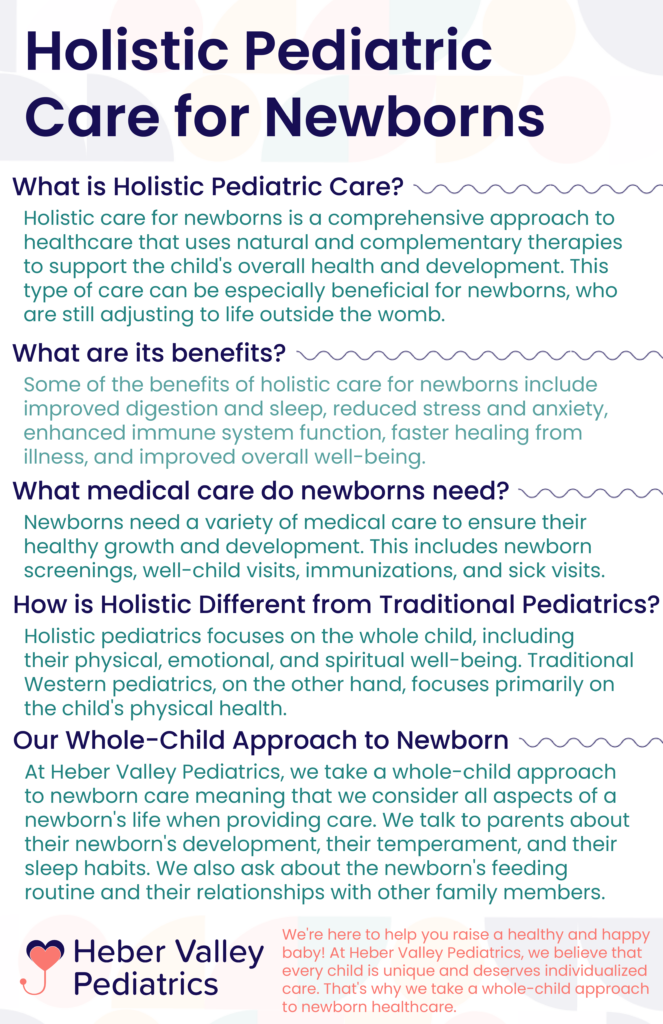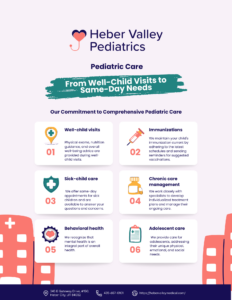
At Heber Valley Pediatrics, we believe that every newborn deserves the best possible start in life. That’s why we offer holistic care for newborns, which takes into account all aspects of their physical, mental, and emotional health. We understand that newborns are particularly vulnerable to the effects of stress, including environmental toxins, processed foods, and even the birth process itself. Holistic pediatric care can help to mitigate these stressors and support the healthy development of your newborn.
What is Holistic Pediatric Care for Newborns?
At Heber Valley Pediatrics, we believe that all aspects of a child’s health are interconnected, including their physical, emotional, and spiritual well-being. That’s why we offer a holistic approach to newborn care that focuses on the whole child.
Holistic care for newborns is a comprehensive approach to healthcare that uses natural and complementary therapies to support the child’s overall health and development. This type of care can be especially beneficial for newborns, who are still adjusting to life outside the womb.
We prioritize our newborn patients by providing alternative immunization schedules depending on the family’s needs and preferences. Pediatric care is not a one-size-fits-all practice at Heber Valley Pediatrics.
Some of the benefits of holistic care for newborns include:
- Improved digestion and sleep
- Reduced stress and anxiety
- Enhanced immune system function
- Faster healing from illness
- Improved overall well-being
What medical care do newborns need?
Newborns need a variety of medical care to ensure their healthy growth and development. This includes:
- Newborn screenings: These tests are done in the hospital to check for a variety of genetic and metabolic disorders.
- Well-child visits: These visits start soon after your baby is born and continue throughout their childhood. At well-child visits, your pediatrician at Heber Valley Pediatrics will check your baby’s growth and development, create an immunization schedule, and answer any questions you have.
- Immunizations: Vaccines are one of the best ways to protect your baby from serious diseases. Newborns need a series of vaccines to protect them from diseases such as measles, mumps, rubella, diphtheria, tetanus, pertussis, polio, hepatitis B, and rotavirus. We customize vaccine plans to fit your child’s development.
- Sick visits: If your baby gets sick, you will need to take them to the pediatrician for a sick visit. Your pediatrician will examine your baby and determine the best course of treatment.
In addition to these routine medical care needs, some newborns may need additional medical care depending on their individual circumstances. For example, premature babies or babies with certain medical conditions may need to be seen by a specialist. Dr. David Larson specializes in ADHD, anxiety, autism, epilepsy, and other chronic pediatric conditions.
What shots does a newborn get?
Newborns receive a series of vaccines to protect them from serious diseases. The CDC recommends a general schedule for newborn vaccines. At Heber Valley Pediatrics, we consider the whole child when determining alternative vaccine plans. Generally speaking, the following is a schedule of the recommended vaccines for newborns in the United States:
- At birth: Hepatitis B (HepB)
- At 2 months: Diphtheria, tetanus, and pertussis (DTaP), inactivated poliovirus vaccine (IPV), rotavirus, and Haemophilus influenzae type b (Hib)
- At 4 months: DTaP, IPV, rotavirus, Hib, and pneumococcal conjugate vaccine (PCV13)
- At 6 months: DTaP, IPV, PCV13, Hib, and influenza vaccine (flu shot)
- At 12 months: DTaP, IPV, Hib, PCV13, measles, mumps, and rubella (MMR), varicella (chickenpox), and hepatitis A (HepA)
Some vaccines may be given in combination, such as the DTaP-IPV-Hib vaccine and the MMR vaccine. Your baby will also need a booster shot of some vaccines later in childhood.
It is important to note that this is just a general schedule and your baby’s vaccination schedule may vary depending on their individual circumstances. For example, premature babies or babies with certain medical conditions may need to be vaccinated on a different schedule.
Talk to your pediatrician about your baby’s vaccination schedule to ensure that they receive all of the recommended vaccines.
How is Holistic Pediatrics Different from Traditional Western Pediatrics?
Holistic pediatrics is a different approach to healthcare than traditional Western pediatrics. Holistic pediatrics focuses on the whole child, including their physical, emotional, and spiritual well-being. Traditional Western pediatrics, on the other hand, focuses primarily on the child’s physical health.
Here are some of the key differences between holistic pediatrics and traditional Western pediatrics:
- Focus: Holistic pediatrics focuses on the whole child, including their physical, emotional, and spiritual well-being. Traditional Western pediatrics, on the other hand, focuses primarily on the child’s physical health.
- Prevention: Holistic pediatrics emphasizes prevention and wellness. Traditional Western pediatrics, on the other hand, tends to focus on treating illness and disease.
- Treatment: Holistic pediatrics uses a variety of natural and complementary therapies to treat illness and disease. Traditional Western pediatrics, on the other hand, typically uses conventional medical treatments, such as medications and surgery.
- Collaboration: Holistic pediatricians often work with other healthcare professionals, such as nutritionists, chiropractors, and acupuncturists, to provide comprehensive care for their patients. Traditional Western pediatricians, on the other hand, typically work independently.
Taking a Whole-Child Approach to Newborn Health
At Heber Valley Pediatrics, we believe that a newborn’s mental and emotional health are just as important as their physical health. That’s why we take a whole-child approach to newborn care.
What does this mean for newborns? It means that we consider all aspects of a newborn’s life when providing care. We talk to parents about their newborn’s development, their temperament, and their sleep habits. We also ask about the newborn’s feeding routine and their relationships with other family members.
We believe that by understanding the whole newborn, we can better meet their individual needs. For example, if a newborn is having trouble sleeping, we may recommend changes to their bedtime routine or feeding schedule. If a newborn is having difficulty adjusting to life outside the womb, we may recommend massage therapy or other calming techniques.
Here are some tips for taking a whole-child approach to newborn health:
- Create a safe and loving environment. Newborns need to feel safe and loved in order to thrive. This means providing them with a warm and nurturing space, as well as plenty of physical contact and affection.
- Respond to your newborn’s cries promptly. Newborns cry for a variety of reasons, including hunger, tiredness, and discomfort. It’s important to respond to your newborn’s cries promptly and lovingly. This will help them to feel secure and loved.
- Promote bonding. Bonding with your newborn is important for both of you. You can bond with your newborn by spending time with them, cuddling them, and talking to them.
- Talk to your pediatrician. If you have any questions or concerns about your newborn’s health, please don’t hesitate to talk to your pediatrician. We are here to support you and your newborn every step of the way.
We’re here to help you raise a healthy and happy baby! At Heber Valley Pediatrics, we believe that every child is unique and deserves individualized care. That’s why we take a whole-child approach to newborn healthcare. We consider all aspects of a newborn’s life when providing pediatric care, including their physical, mental, and emotional health.






2 comments